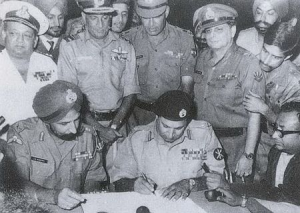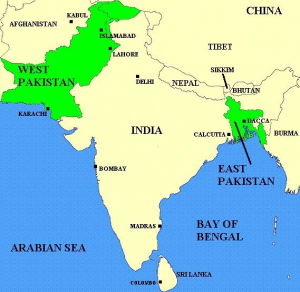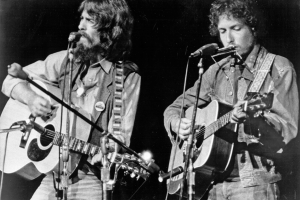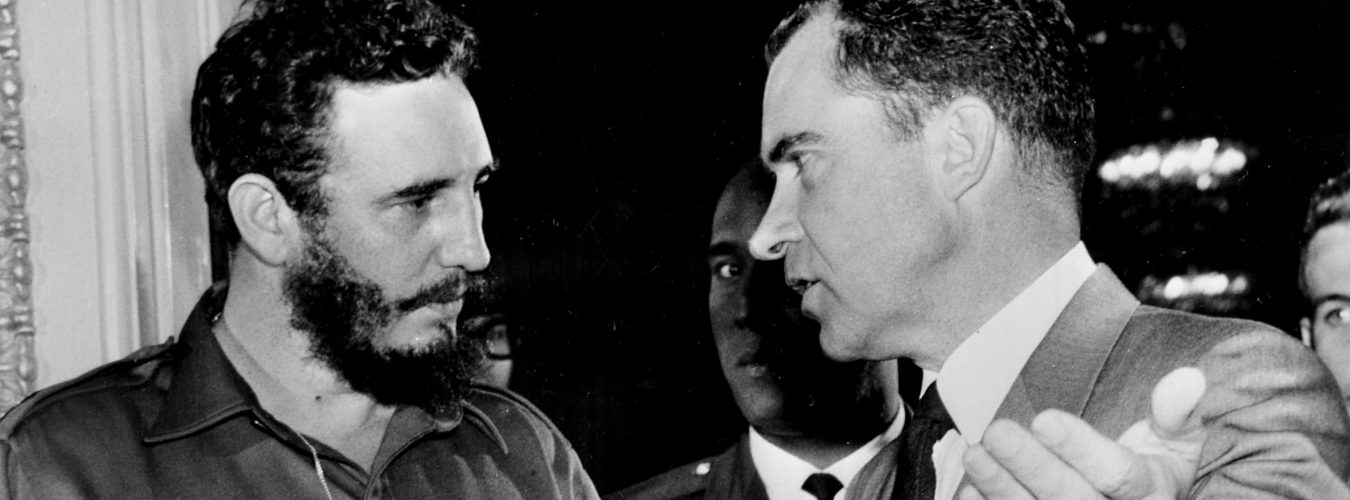Genocide, humanitarian crisis, and a Cold War epicenter: the Bangladesh Liberation War was one of the most transformative conflicts of the 20th century. After an election dispute, brutal civil war waged throughout 1971 between East and West Pakistan, and following Indian military engagement in early December, the war concluded just thirteen days later on December 16, 1971. Bangladesh, formerly East Pakistan, emerged as an independent nation, and global power dynamics and alliances shifted permanently.


In the postcolonial partition of 1947 as Britain surrendered its South Asian holdings, two nation states were established: India and Pakistan. Interestingly, the nation of Pakistan was not a contiguous state, as Western and Eastern Pakistan were separated by a considerable distance by Northern India. While they were partitioned as the same nation, East and West Pakistan had centuries-old divisions across ethnic, cultural, and most prominently, religious lines, as Eastern Pakistanis were predominantly Muslim while the East largely practiced Hinduism. These tensions came to a head following the election victory of Sheik Mujib-ur-Rahman, a Bengali Muslim from Eastern Pakistan, in December of 1970. Western Pakistan ignored the results of this election and initiated state-sponsored military action to suppress Eastern Pakistan over the course of the following year. In response, Eastern Pakistan declared itself independent in March of 1971, although this was not recognized by most major powers. Throughout 1971, over 300,000 Bengalis, mostly Hindus, were killed by the Pakistani army, and an estimated 10 million other Bengalis fled to India as refugees. Given this brutality and that the humanitarian crisis was straining India’s infrastructure and resources, Indian Prime Minister Indira Gandhi took military action to support the independence efforts of East Pakistan. Following the entry of India, Western Pakistani holds on Eastern territory quickly diminished, and on December 16, 1971, Pakistan surrendered, granting Bangladesh independence.
In addition to regional tensions, the conflict was deeply implicated in the Cold War. First, Nixon’s administration was aware of the atrocities occurring in the region, yet consistently ignored pleas for relief from both the Bengalis and U.S. ambassadors to India and Pakistan, culminating in a private dissent by Ambassador Archer Blood who stated in a telegram, “Our government has failed to denounce atrocities… (and) has evidenced what many will consider moral bankruptcy.” Ultimately, Nixon made the calculated decision to reaffirm U.S. support of the Western Pakistani regime to serve his political and diplomatic aspirations. Given that Western Pakistan was strong allies with China, Nixon believed that supporting Western Pakistani General Yahya Khan would be the key to securing a U.S-Chinese summit in 1972. Further polarizing the situation, in 1971, the Soviet Union supported Bangladesh, and India had loosened its stance on non-alignment by signing the Indo-Soviet Treaty of Peace, Friendship and Cooperation, symbolizing a stern Soviet opposition to American interests. With political, economic, and diplomatic support from the respective superpowers, India, Pakistan, and Bangladesh were all implicated in the complex dealings of the international moment.
There was strong division among the U.S. public regarding the conflict, which is reflected by articles in the New York Times that demonstrate a wide range of public opinion. William Stokes, a U.S. foreign service officer to Thailand, defended the policy of supporting Pakistan and condemning Indian invasion. He argued that “the United States has spoken out consistently… against the expedition of armies across established frontiers against recognized governments.” Thus, Stokes believed that the United States was solely defending the autonomy of the Pakistani state to manage its affairs internally without the threat of invasion from neighboring nations. However, many strongly disagreed with this position. Donald Smith, a professor at the University of Pennsylvania, argued that the United States hurt its moral image, stating that the United States expressed “our abhorrence of war (when waged by others), but previous months of official silence had shown that we were much more tolerant of genocide.” The Soviet Union, he contended, had outmaneuvered the United States by supporting India and Bangladesh and emerged with greater influence in South Asia as the nation with the higher moral character.

In addition to scholarly and formal critiques of the conflict, concerns over brutality and American inaction in Bangladesh spilled into popular culture, as former Beatle George Harrison began to organize a charity concert to benefit the Bengali refugees in early 1971. After recruiting several other star musicians, including Bob Dylan, Ringo Starr, and Eric Clapton, the concert was performed on August 1, 1971, with ticket and record sales from the performance amounting to nearly four million dollars in aid granted to UNICEF. Ultimately, this concert and widespread dissent within the United States regarding the atrocities in Bangladesh further symbolized the disconnect between the moral considerations of the American public and the actions by the federal government abroad in the Vietnam era.
Works Cited
Agarwal, Ankit. "The United States and the Indo-Pakistani War of 1971: A Critical Inquiry." Indian Journal of Asian Affairs 27/28, no. 1/2 (2014): 21-42. Ali, Mehrunnisa. "China’s Diplomacy During the Indo-Pakistan War, 1971." Pakistan Horizon 25, no. 1 (1972): 53-62. Blood, Archer. “Dissent from U.S. Policy Toward East Pakistan.” George Washington University Archives, Newport News, VA, 1971. Craig, Campbell and Logevall, Fredrik. America’s Cold War: The Politics of Insecurity. Cambridge, MA: Harvard University Press, 2020. Filkins, Dexter. “Collateral Damage.” New York Times, Sept. 26, 2013. “The George Harrison Bangladesh Benefit.” Rolling Stone, Sept. 2, 1971. Savranskaya, Svetlana and William Taubman. “Soviet Foreign Policy, 1962–1975.” In The Cambridge History of the Cold War, eds. Melvyn P. Leffler and Odd Arne Westad, 2. Cambridge University Press, 2010: 134–57. Smith, Donald E. "U.S. Policy in South Asia." New York Times, Jan 05, 1972: 36. Stokes, William N. "U.S. Policy in South Asia Defended." New York Times, Jan 06, 1972: 36.

